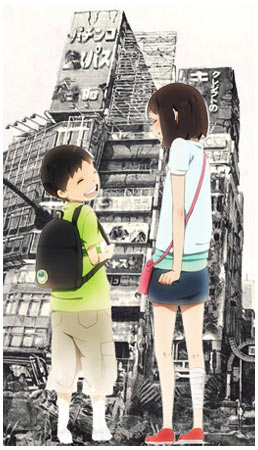I have an odd policy when it comes to anime: I watch nearly every show twice. If it’s worth watching once, I figure, it’s worth a second viewing, since you’ll always find something you missed the first time around, some subtle nuance of story or character that’s worth appreciating. It’s with great trepidation, therefore, that I started re-watching the now-prophetic Tokyo Magnitude 8.0, which tells the story of a large earthquake centered in Tokyo and the journey of a girl named Mirai and her younger brother Yuki to get back home, with the help of a woman named Mari. The project was conceived by Fuji TV and animation studio Bones as a way to realistically portray how a serious disaster might unfold, to tell an interesting story as well as to prepare people for this kind of disaster ahead of time. The series is great, with fascinating and realistic characters and better writing than a whole shelf of anime series, and I recommend it (but keep a box of tissues handy).
The show is interesting in another way, because it lets those living outside Japan experience a realistic side of modern Japanese young people in the 21st century, in the character of the 13-year-old Mirai. At the beginning of the series, she uses her keitai (cell phone) constantly to retreat from the real world and all its unpleasantness, earning her the nickname keitai seijin, or “Alien from Planet Cell Phone.” Mirai is constantly bored, lacking the capacity to be emotionally moved by anything, and the only opinions she offers about the world are futsu (translatable as “normal” or “same as usual” but in this case it functions more like “whatever” or “I don’t care”) and betsu ni (meaning “nothing in particular”), which are indicative of her general melancholy about life. In the first episode she becomes frustrated with everything and says, “I wish the whole world would be destroyed,” and naturally that’s when the quake hits. By the end of the show she’s changed greatly, a personal journey that can be compared to Spirited Away, only with more sadness and earthquakes. I am secretly hopeful that Japan’s young people, who have been heiwa boke (hei-wa boh-kay), meaning “spoiled rotten from too much peace and prosperity,” will somehow be changed for the better by the great tragedy Japan has experienced, and will realize the preciousness of life, like Mirai eventually did.

I’m re-watching Tokyo Magnitude 8.0 now…wish me luck.














